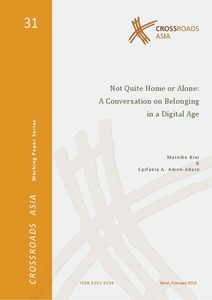Not Quite Home or Alone: A Conversation on Belonging in a Digital Age

Not Quite Home or Alone: A Conversation on Belonging in a Digital Age

| dc.contributor.author | Bier, Mareike | |
| dc.contributor.author | Amoo-Adare, Epifania | |
| dc.contributor.editor | Baldauf, Ingeborg | |
| dc.contributor.editor | Conermann, Stephan | |
| dc.contributor.editor | Kreutzmann, Hermann | |
| dc.contributor.editor | Nadjmabadi, Shahnaz | |
| dc.contributor.editor | Reetz, Dietrich | |
| dc.contributor.editor | Schetter, Conrad | |
| dc.contributor.editor | Sökefeld, Martin | |
| dc.contributor.editor | Bech Hansen, Claus Erik | |
| dc.contributor.editor | Hornidge, Anna-Katharina | |
| dc.contributor.editor | Nokkala, Nelli | |
| dc.contributor.editor | Mielke, Katja | |
| dc.date.accessioned | 2016-10-06T12:45:37Z | |
| dc.date.available | 2016-10-06T12:45:37Z | |
| dc.date.issued | 02.2016 | |
| dc.identifier.uri | https://hdl.handle.net/20.500.11811/166 | |
| dc.description.abstract | This paper is the product of conversations we have had over a significant period of time about the meaning of belonging in a digital age. It began as a series of personal answers to the question: “Where would you consider as home?”, and now seeks to reach out to other debates on this essential question. For several months, we—two women from different origins, of different ages, with different skin tone and very different memories—have been reflecting on our past inhabitancies and the mobility turns that we have taken in our lives. In doing so, we find that the German term “Heimat” and its English translations “home” and “homeland”, are all fuzzy, flexible concepts. Finding a place one calls “home” is no easy task in the ever-changing and chaotic world that we currently live in; that is, a place in which we are experiencing significant mobility, alongside a loss of physicality via the internet. At the same time, questions of belonging and rootedness gain importance: “Where do I come from?”, “Where do I belong?” and “Who am I?” Additionally, within a contradictory complexity such as ours, the inquiry “what do we mean by belonging in a digital age” must arise. It is in pursuit of a semblance of an answer to such a crucial question that we offer our academic and personal contemplations on the concepts “Heimat”, “home” and “homeland”, as well as our ruminations on the effects of spatial mobility and digitalization (e.g., New Media) on the definitions of those concepts and their accompanying senses of belonging. We believe it is critical for us to try to understand these complicated constitutions of our possessive selves, especially if one seeks to determine how to foment a pluralistic, post-oppositional and loving sense of belonging—even within the social constructions of our diverse becomings. | en |
| dc.format.extent | 34 | |
| dc.language.iso | eng | |
| dc.relation.ispartofseries | Crossroads Asia Working Paper Series ; 31 | |
| dc.rights | In Copyright | |
| dc.rights.uri | http://rightsstatements.org/vocab/InC/1.0/ | |
| dc.subject | Mobility | |
| dc.subject | Digitalization | |
| dc.subject | New media | |
| dc.subject | Home | |
| dc.subject | Homeland | |
| dc.subject | Heimat | |
| dc.subject | Belonging | |
| dc.subject | Identity | |
| dc.subject.ddc | 300 Sozialwissenschaften, Soziologie, Anthropologie | |
| dc.title | Not Quite Home or Alone: A Conversation on Belonging in a Digital Age | |
| dc.type | Arbeitspapier | |
| dc.publisher.name | Competence Network Crossroads Asia: Conflict – Migration – Development | |
| dc.publisher.location | Bonn | |
| dc.rights.accessRights | openAccess | |
| dc.relation.eissn | 2192-6034 | |
| dc.relation.url | http://crossroads-asia.de/veroeffentlichungen/working-papers.html | |
| ulbbn.pubtype | Zweitveröffentlichung |
Files in this item
This item appears in the following Collection(s)
-
Crossroads Asia Working Paper Series (37)
Working Paper des Kompetenz-Netzwerks Crossroads Asia




